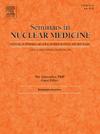AI in Breast Cancer Imaging: An Update and Future Trends
IF 5.9
2区 医学
Q1 RADIOLOGY, NUCLEAR MEDICINE & MEDICAL IMAGING
引用次数: 0
Abstract
Breast cancer is one of the most common types of cancer affecting women worldwide. Artificial intelligence (AI) is transforming breast cancer imaging by enhancing diagnostic capabilities across multiple imaging modalities including mammography, digital breast tomosynthesis, ultrasound, magnetic resonance imaging, and nuclear medicines techniques. AI is being applied to diverse tasks such as breast lesion detection and classification, risk stratification, molecular subtyping, gene mutation status prediction, and treatment response assessment, with emerging research demonstrating performance levels comparable to or potentially exceeding those of radiologists. The large foundation models are showing remarkable potential in different breast cancer imaging tasks. Self-supervised learning gives an insight into data inherent correlation, and federated learning is an alternative way to maintain data privacy. While promising results have been obtained so far, data standardization from source, large-scale annotated multimodal datasets, and extensive prospective clinical trials are still needed to fully explore and validate deep learning's clinical utility and address the legal and ethical considerations, which will ultimately determine its widespread adoption in breast cancer care. We hereby provide a review of the most up-to-date knowledge on AI in breast cancer imaging.
人工智能在乳腺癌成像中的应用:最新进展和未来趋势。
乳腺癌是影响全世界妇女的最常见的癌症之一。人工智能(AI)正在通过增强多种成像方式的诊断能力来改变乳腺癌成像,包括乳房x光检查、数字乳房断层合成、超声波、磁共振成像和核医学技术。人工智能正被应用于各种任务,如乳房病变检测和分类、风险分层、分子分型、基因突变状态预测和治疗反应评估,新兴研究表明,人工智能的表现水平与放射科医生相当,甚至可能超过放射科医生。大型基础模型在不同的乳腺癌成像任务中显示出显著的潜力。自监督学习可以深入了解数据的内在相关性,而联邦学习是维护数据隐私的另一种方法。虽然到目前为止已经取得了令人鼓舞的结果,但仍然需要从来源进行数据标准化,大规模注释多模态数据集,以及广泛的前瞻性临床试验,以充分探索和验证深度学习的临床应用,并解决法律和伦理问题,这将最终决定其在乳腺癌治疗中的广泛采用。在此,我们对人工智能在乳腺癌成像方面的最新知识进行了综述。
本文章由计算机程序翻译,如有差异,请以英文原文为准。
求助全文
约1分钟内获得全文
求助全文
来源期刊

Seminars in nuclear medicine
医学-核医学
CiteScore
9.80
自引率
6.10%
发文量
86
审稿时长
14 days
期刊介绍:
Seminars in Nuclear Medicine is the leading review journal in nuclear medicine. Each issue brings you expert reviews and commentary on a single topic as selected by the Editors. The journal contains extensive coverage of the field of nuclear medicine, including PET, SPECT, and other molecular imaging studies, and related imaging studies. Full-color illustrations are used throughout to highlight important findings. Seminars is included in PubMed/Medline, Thomson/ISI, and other major scientific indexes.
 求助内容:
求助内容: 应助结果提醒方式:
应助结果提醒方式:


